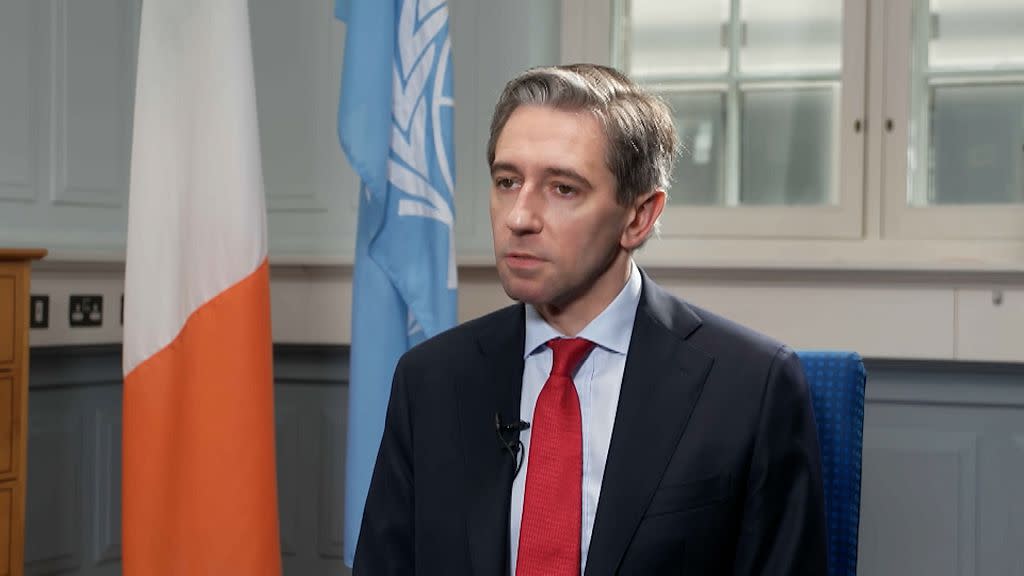What's happening in Gaza is 'unconscionable', says Irish PM Harris

Europe is on the wrong side of history for failing to do enough to stop the bloodshed in Gaza, according to Irish Prime Minister Simon Harris.
“There will be a moment in the future where your children and your grandchildren and great-grandchildren will ask, what did you do? What did you do? And did you do enough? And that should keep every single one of us awake at night, because there are children in Gaza, there are children in Rafah, who go to sleep at night not knowing if they'll wake," he told Euronews in an exclusive interview.
In coordinated announcements, the Irish government on Wednesday announced it will recognise Palestine alongside Spain and Norway, with Slovenia and potentially Belgium likely to follow suit.
PM Harris said the objective was to "breathe life" into the two-state solution which had been all but destroyed or "killed off" in the last 30 years.
“I don't think the Netanyahu government is in any way, shape or form committed to the delivery of a two-state solution. I think in recent weeks, in recent months, we have seen very many efforts to kill off that hope."
He said neither history nor politics were justifiable reasons to refuse to criticise Israel for the offensive which has killed over 35,000 people – the majority of them women and children, or caused starvation and dire catastrophic harm to civilian life.
Speaking in Dublin he defended his decision saying it was about the just application of international law and an agreed settlement guaranteeing the right to self-determination and dignity of Palestinians alongside the rights of Israelis in a Jewish Israeli state.
“It's not about being pro-Israeli or pro-Palestinian. It's about being pro-international law. It's been about pro-human rights. It's been pro-peace. And I think what's happening in Gaza is unconscionable," Harris added.
"Are we doing everything we can to apply as much pressure as we possibly can to create the environment that needs to be created to bring about an immediate ceasefire? That's a question for Europe. It's a question for the United States.”
Ireland and Spain requested last February for the EU to review whether Israel is in breach of the human rights clause in the EU-Israel Association Agreement.
Harris said it was "regrettable" the review has not taken place and criticised the EU for apparent double standards when it comes to the application of rules on human rights when it comes to Israel as opposed to other countries.
He was also scathing of the fact that the EU wasn’t able to find a cohesive position on this, and the application of other aspects of international law.
“I believe more can be done and should be done.”
“And what I mean by that is specifically the association agreements between the European Union and Israel that has within its human rights clauses. And they weren't put in to make the document longer. They weren't put in as padding. They have real effect, they are real and meaningful words."
"I don't understand being quite frank, I don't understand why simply asking to review the agreement from a human rights perspective hasn't taken place. I think that's regrettable.”
The prime minister hit out at critics of his and others' decision such as the Israeli government which recalled its ambassadors to the three states "for consultation". Israel says the three countries' move rewards Hamas, as it comes seven months after the deadly terrorist attack committed by the militant group on October 7th.
“What they did to the people of Israel was despicable, was brutal. And the hostage-taking to this day is added cruelty on top of that massacre and terrorist attack that the people of Israel experienced and those hostages should be released unconditionally," said Harris.
But, he added, Israel’s assault does the opposite of protecting its civilians.
“We take the issue of security of Israel and the Israeli people extraordinarily important. But what's happening now has to stop. I mean, the idea that what's happening now is sustainable or indeed in any way guarantees Israel's security is such a misplaced, such a misplaced view. There it is a dead end in every sense of the world."
"If you want to bring peace, we have to get into a political peace process that recognises two states."
"There have been many times and many false dawns in the past. But out of this most horrific scenario, horrific terrorist attack for Israel, most horrific humanitarian catastrophe for the people of Palestine has to ultimately become a moment where we can move towards peace.”


